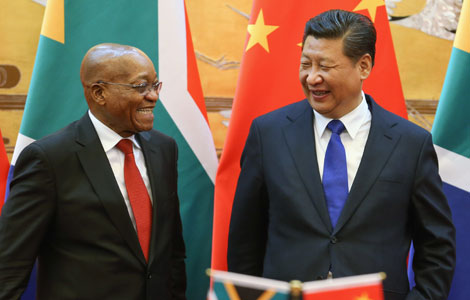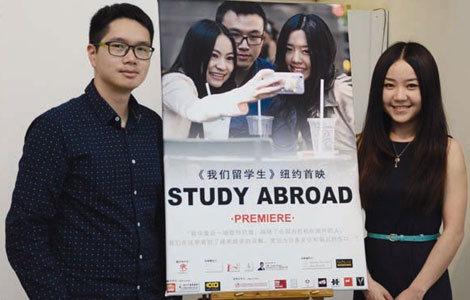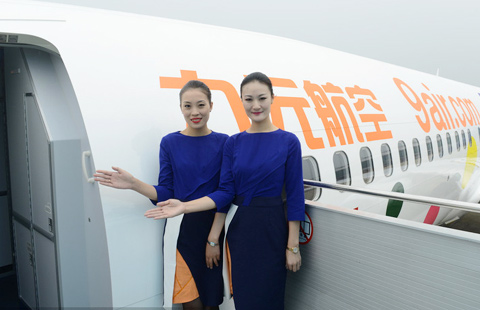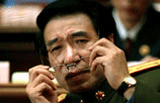Changes needed to keep students in China
Updated: 2014-12-05 14:27
By Li Yang in Shanghai(China Daily USA)
|
|||||||||
|
Learning English is the first step for Chinese students to study abroad. This is an English-language teaching school in Lujiazui of Shanghai. Gao Erqiang / China Daily |
Chinese entrepreneurs have wider connections around the world now, and they can find reliable contacts to help them send their children overseas to study, according to the chief researcher for the Hurun Report.
Rupert Hoogewerf, chief researcher with the Hurun Report, told the Shanghai Oriental Morning Post that 10 years ago, most of the Chinese who had friends and relatives in Western countries were concentrated inAustraliaandCanada.
The Hurun Report, a Shanghai-based luxury publishing and events group, released a recent study that showed more than 80 percent of high net worth Chinese plan to send their children to study abroad. That number is only 1 percent inJapan, 5 percent inFranceand no more than 10 percent inGermany, said the report.
The worsening environmental pollution and food safety conditions are also reasons why wealthy parents want to send their children to study abroad at an increasingly younger age.
"Despite the government's efforts to clean the environment, I think it will take a long time to clean the air and water," said an entrepreneur in a State-owned enterprise inBeijing, who plans to send his son toCanadato attend junior middle school. The father asked not to be identified.
"It depends on the upgrading of industries, and transformation of economic structure, which will be a slow process in my opinion," he added.
TheUnited States, theUnited Kingdom,CanadaandAustraliaare the four most popular overseas education destinations for children from rich Chinese families, followed by Switzerland,Singapore,France,JapanandGermany.
There are 235,000 Chinese students studying in theUS, and 135,000 in theUK. Finance, business and commerce are the most popular majors for Chinese students.
The average age of Chinese students going abroad is 18 years old. And the average age of Chinese students from rich families is 16 years old; 23.9 percent of rich families send their children abroad to study in college; 22.9 percent study in high school. More wealthy parents said they intended to let their children begin their overseas education starting from primary and junior middle schools.
Statistics from the Education Ministry show that nearly 4 million Chinese went abroad to study since 1978, the yearChinalifted control of its citizens studying abroad.
The 4 million Chinese students studying abroad take with them at least 80 billion yuan ($13 billion). If the money the Chinese government spends subsidizing their previous education at home is counted, it would be a heavier loss of Chinese economy.
Analysts saidthe phenomenon is also a serious brain drain forChinaand will affect future social and economic development.
China's education authority is faced with the prospects of young people flocking to foreign schools.China's education is geared toward the college entrance examination, and doesn't emphasize young people's creativity, independence and critical thinking.
Nearly 1 million high school graduates, about 17 percent of the overall number each year, forgo the college entrance exam, or gaokao, with some believing that a college education is of questionable value and that the four years on campus should be better spent doing some work or learning some skills.
Chinatried to reform the gaokao system more than 10 years by granting some key universities more autonomy and independence in enrolling high school graduates. But some enrollment officials and teachers of the universities take the freedom brought by the reform as a power to seek bribes from the students' parents.
Before the corruption of universities is addressed, gaokao seems the only feasible means, despite its negative influence on middle school education inChina, to ensure fairness in college enrollment.
Some wealthy Chinese families simply choose to send their children to study abroad.
"The dilemma inChina's education reform is obvious," said a civil servant in Wuxi of Jiangsu province, who just sent her son to a primary school in Connecticut. But the authority seems increasingly content with the gaokao system. The direction of gaokao reform is not to abolish the test, but grant each province the rights to organize their own gaokao to replace a national one.
"This is to put an old wine in a new bottle. Wuxihas been famous in Chinese history for its developed education. But the gaokao makes it no different from other places in terms of the exam-oriented content of its education today," the mother added, who requested anonymity.
liyang@chinadaily.com.cn

 China, South Africa sign economic pacts
China, South Africa sign economic pacts
 Film takes on Chinese stereotypes in US
Film takes on Chinese stereotypes in US
 Texas tries to lasso China
Texas tries to lasso China
 Obamas usher in Xmas with lighting of national tree
Obamas usher in Xmas with lighting of national tree
 Family of nine struggles to survive
Family of nine struggles to survive
 World news pictures of the year 2014
World news pictures of the year 2014
 S. Africa marks first anniv. of Mandela's death
S. Africa marks first anniv. of Mandela's death
 China's budget aviation sector has new comer
China's budget aviation sector has new comer
Most Viewed
Editor's Picks

|

|

|

|

|

|
Today's Top News
Intel to invest $1.6b in Chengdu plant
China, South Africa sign economic pacts
China eyes Paris climate pact
Major general netted in anti-graft campaign
Xi vows military boost
Film takes on Chinese stereotypes in US
Best Buy getting out of China
Best Buy bids adieu to China after struggle with high costs
US Weekly

|

|









